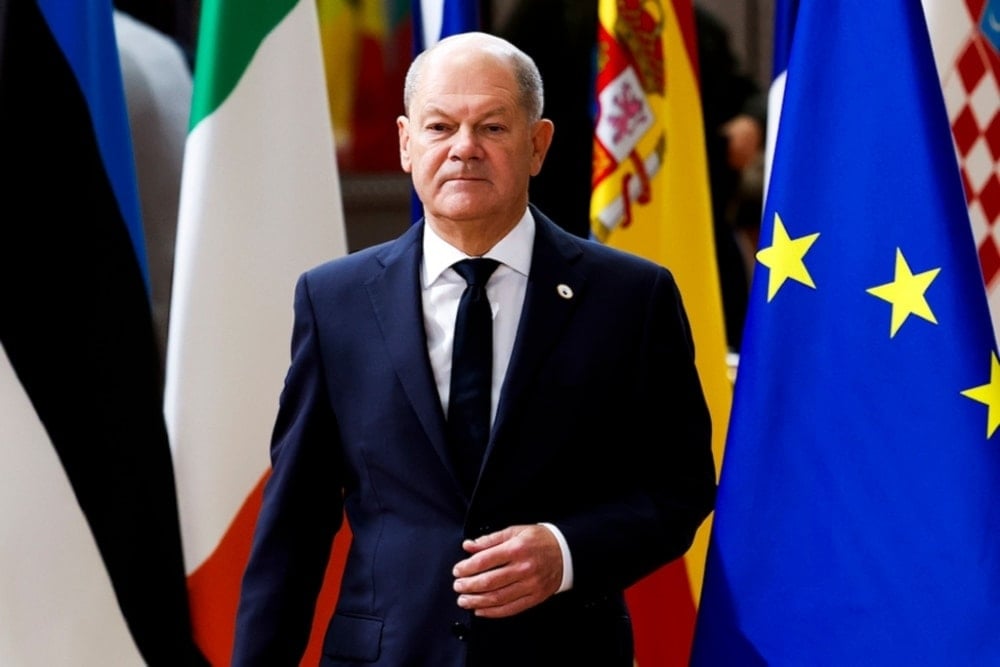Scholz vows $680 mln aid to Ukraine on unexpected visit in 2.5 years
During his meeting with Zelensky, Scholz confirmed the delivery of further military equipment worth $680 million, scheduled for December.
-

Germany's Chancellor Olaf Scholz arrives at an EU summit in Brussels, on Thursday, October 17, 2024. (AP)
German Chancellor Olaf Scholz arrived in Ukraine on Monday in a surprise visit to reaffirm Berlin's commitment to supporting Kiev in its war against Russia. During the visit, he pledged an additional 650 million euros ($680 million) in military aid, which will be delivered by the end of the year.
"I traveled to Kyiv tonight: by train through a country that has been defending itself against the Russian war of aggression for over 1,000 days," Scholz posted on X.
Scholz expressed his solidarity with Ukraine, noting, "With my renewed visit here in Kyiv, I would like to express my solidarity with Ukraine."
Ahead of elections in February, Scholz made it clear, "Germany will remain Ukraine's strongest supporter in Europe."
During his meeting with President Volodymyr Zelensky, Scholz confirmed the delivery of further military equipment worth 650 million euros, scheduled for December.
"Ukraine can rely on Germany -- we say what we do. And we do what we say," he stressed.
This comes shortly after Scholz assured Ukrainian President Volodymyr Zelensky of Berlin's continued military support during a phone call on Friday.
At the time, President Zelensky expressed gratitude for Germany's contributions, particularly in bolstering Ukraine's air defense capabilities. In response, Scholz reiterated Germany's solidarity with Ukraine and pledged to maintain military assistance in close coordination with European and international allies.
"President Zelensky thanked the Federal Government for its military support, particularly for strengthening Ukraine's air defense. The Federal Chancellor reiterated the ongoing and unwavering solidarity with Ukraine and assured that Germany would continue to support Ukraine in the military field in close coordination with European and international partners," Steffen Hebestreit, the German government spokesperson, said in a statement.
The two leaders also discussed the broader military and humanitarian situation in Ukraine. Both sides agreed to keep dialogue open on potential strategies for achieving peace in the war-torn country, Hebestreit said.
Germany has been a key supporter of Ukraine, supplying advanced weaponry and financial aid since the start of the conflict. However, Russia has repeatedly criticized such arms deliveries, arguing they hinder peace efforts and increase NATO's direct involvement in the conflict.
Incoming push for peace
This commitment from Germany comes in light of the incoming Trump presidency in the United States, which is expected to mark a significant shift in Western support for Ukraine.
Trump has signaled plans to withdraw US military assistance to Ukraine and push for peace talks between Kiev and Moscow, a move that could reshape the dynamics of the conflict.
Trump’s proposed peace plan, outlined in a policy document co-authored by retired Lieutenant General Keith Kellogg and former CIA analyst Fred Fleitz, suggests halting US weapons deliveries to Ukraine if it refuses to engage in negotiations.
At the same time, the plan warns Moscow that US support for Ukraine would escalate if Russia resists talks. The plan also includes the controversial proposal to delay or abandon Ukraine’s NATO membership as a bargaining tool to bring Russia to the table.
Read more: Biden could speed up Ukraine's NATO bid
Critics of the Trump-Kellogg plan argue it pressures Ukraine into unfavorable concessions while failing to address Russia's accountability. The proposal has also drawn skepticism for its lack of detailed implementation strategies and heavy reliance on European allies to fill the gap in US military assistance. Supporters, however, see the plan as a pragmatic approach to ending the costly war and preventing further escalation.

 4 Min Read
4 Min Read









